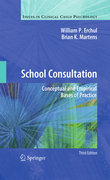
School consultation: conceptual and empirical bases of practice
Erchul, William P.
Martens, Brian K.
Since its emergence during the 1960s, school consultation has become an important vehicle for delivering psychological and educational services. Cooperative efforts between skilled consultants and teachers, rooted in the principles of problem solving, social influence, and professional development, enhance student learning and adjustment while encouraging consultees to be more effectiveand proactive in their practice. The Third Edition of School Consultation: Conceptual and Empirical Bases of Practice shows in expert detail how this relationship works by synthesizing mental health and behavioral models of consultation with the most effective evidence-based practices (e.g., implementation support, response to intervention) informing the field today. The authors providereal-world contexts for all participants in the equation—consultants, teachers, students, staff, and the school itself—and thoroughly review consultation processes and outcomes for a contemporary practice-oriented approach suited to the new consultant, trainee, or researcher. Key features of the Third Edition include: An integrated mental health/behavioral model for school consultation.An organizational study of the school as a setting for consultation. Assessment issues and strategies particularly relevant to school consultation. Approaches to providing teachers with implementation support. Conceptual models for selecting academic and behavioral interventions. Administrative perspectives onschool consultation. A real, transcribed case study analyzed by the authors. In the tradition of its predecessors, School Consultation, Third Edition, is aconfidence-building tool for practitioners in school psychology, clinical child psychology, educational specialties, school counseling, special education, and school social work as well as a trusted reference for researchers in thesefields. Promotes a scientist-practitioner viewpoint by providing guidance forthe practice of school consultation based on research findings Offers a preliminary integration of the consultation literature with the emerging RTI/problem-solving literature Considers school consultation as a type of interpersonal influence process, and then applies relevant literature on behavioral change to explain and affect change in consultees, clients, and classrooms Notes the special importance of the school as a setting for consultation and provides an analysis of the school’s personnel, daily activities, and functioning Advancesan integrated model of school consultation based on aspects of the historically separate models of mental health and behavioral consultation, combined withprinciples of interpersonal influence/behavior change, behavioral assessment,and evidence-based interventions Emphasizes the importance of having the consultant use direct assessment measures of client behavior in the contemporary practice of school consultation Includes a transcribed multi-interview consultation case with an accompanying detailed analysis INDICE: Preface.- Section One: Background. Introduction to Consultation. Problem-Solving Models and Response-to-Intervention. Promoting Change in Schools. The School as a Setting for Consultation.- Section Two: Consultation Processes and Outcomes. Bases of an Integrated Model of School Consultation. Model Description and Application. Assessment in School Consultation. Selecting and Evaluating School-based Interventions.- Section Three: Key Participants in Consultation. Teachers as Consultees. Students as Clients. Consultation Case Study.- Epilogue: The Effective Practice of School Consultation.- References. Author Index/Subject Index.
- ISBN: 978-1-4419-5746-7
- Editorial: Springer
- Encuadernacion: Cartoné
- Páginas: 300
- Fecha Publicación: 01/05/2010
- Nº Volúmenes: 1
- Idioma: Inglés
